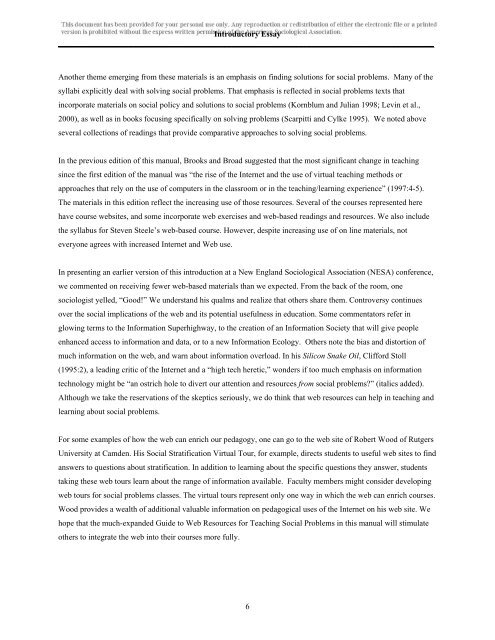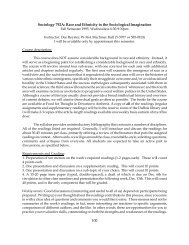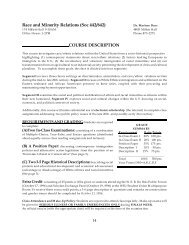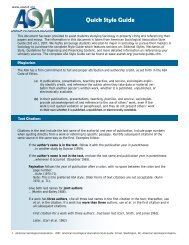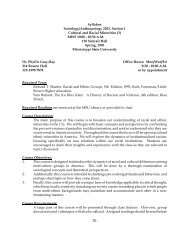Social Problems - American Sociological Association
Social Problems - American Sociological Association
Social Problems - American Sociological Association
Create successful ePaper yourself
Turn your PDF publications into a flip-book with our unique Google optimized e-Paper software.
Introductory Essay<br />
_____________________________________________________________________________________________<br />
Another theme emerging from these materials is an emphasis on finding solutions for social problems. Many of the<br />
syllabi explicitly deal with solving social problems. That emphasis is reflected in social problems texts that<br />
incorporate materials on social policy and solutions to social problems (Kornblum and Julian 1998; Levin et al.,<br />
2000), as well as in books focusing specifically on solving problems (Scarpitti and Cylke 1995). We noted above<br />
several collections of readings that provide comparative approaches to solving social problems.<br />
In the previous edition of this manual, Brooks and Broad suggested that the most significant change in teaching<br />
since the first edition of the manual was “the rise of the Internet and the use of virtual teaching methods or<br />
approaches that rely on the use of computers in the classroom or in the teaching/learning experience” (1997:4-5).<br />
The materials in this edition reflect the increasing use of those resources. Several of the courses represented here<br />
have course websites, and some incorporate web exercises and web-based readings and resources. We also include<br />
the syllabus for Steven Steele’s web-based course. However, despite increasing use of on line materials, not<br />
everyone agrees with increased Internet and Web use.<br />
In presenting an earlier version of this introduction at a New England <strong>Sociological</strong> <strong>Association</strong> (NESA) conference,<br />
we commented on receiving fewer web-based materials than we expected. From the back of the room, one<br />
sociologist yelled, “Good!” We understand his qualms and realize that others share them. Controversy continues<br />
over the social implications of the web and its potential usefulness in education. Some commentators refer in<br />
glowing terms to the Information Superhighway, to the creation of an Information Society that will give people<br />
enhanced access to information and data, or to a new Information Ecology. Others note the bias and distortion of<br />
much information on the web, and warn about information overload. In his Silicon Snake Oil, Clifford Stoll<br />
(1995:2), a leading critic of the Internet and a “high tech heretic,” wonders if too much emphasis on information<br />
technology might be “an ostrich hole to divert our attention and resources from social problems?” (italics added).<br />
Although we take the reservations of the skeptics seriously, we do think that web resources can help in teaching and<br />
learning about social problems.<br />
For some examples of how the web can enrich our pedagogy, one can go to the web site of Robert Wood of Rutgers<br />
University at Camden. His <strong>Social</strong> Stratification Virtual Tour, for example, directs students to useful web sites to find<br />
answers to questions about stratification. In addition to learning about the specific questions they answer, students<br />
taking these web tours learn about the range of information available. Faculty members might consider developing<br />
web tours for social problems classes. The virtual tours represent only one way in which the web can enrich courses.<br />
Wood provides a wealth of additional valuable information on pedagogical uses of the Internet on his web site. We<br />
hope that the much-expanded Guide to Web Resources for Teaching <strong>Social</strong> <strong>Problems</strong> in this manual will stimulate<br />
others to integrate the web into their courses more fully.<br />
6


